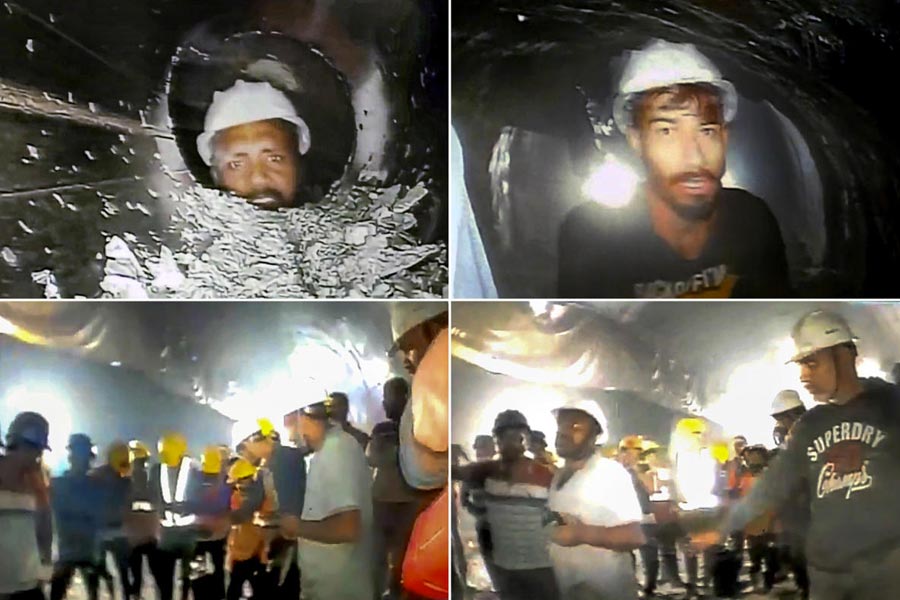The first visuals of the 41 workers trapped inside Silkyara tunnel emerged Tuesday, raising hopes of families anxiously awaiting their evacuation as a multi-pronged rescue effort entered its 10th day.
The visuals were captured using an endoscopic camera sent in through a six-inch pipeline, which was pushed Monday through the rubble of the collapsed portion of tunnel on Uttarakhand’s Char Dham route.
In a video released by the rescue agencies, the workers wearing yellow and white helmets, are seen receiving food items sent to them through the pipeline and talking to each other.
Officials watching them on a screen are heard giving instructions, asking them to clean the lens and show themselves on camera. They are heard asking them to come near the mouth of the pipeline and use the walkie-talkies, apparently sent down earlier.
Relatives have talked earlier to the trapped workers through the four-inch compressor tube that already existed. Food items like dry fruit were also being sent through that pipe.
But the new wider ‘lifeline’, which pierced through 53 metres of rubble, has come as a boost to the morale of the rescue workers. Communication is much better and larger quantities of food can now be sent in.
"I talked to him this morning,” Sunita Hembrum, whose brother-in-law Pradeep Kisku is among the trapped labourers, told PTI. She has come to Silkyara from Banka in Bihar.
“Oranges have been supplied to them through the new food pipe. Efforts are also underway to send khichdi to them. He was fine," she said. "Earlier we had to shout to make ourselves audible but today his voice was clear," she said.
According to officials, food items like dalia, khichdi, sliced apples and bananas can be sent in through the new pipeline. Also, mobile phones and chargers could also be sent to the workers.
Prime Minister Narendra Modi spoke to Uttarakhand Chief Minister Pushkar Singh Dhami on Tuesday, the second day in a row, to enquire about the progress of the rescue effort.
On social media, Dhami said he informed the PM about communicating with the workers using the endoscopic camera. “The prime minister said it is our top priority to rescue all the workers safely," the CM posted.
The tunnel collapsed following a landslide early on November 12, leaving 41 workers trapped behind a huge mound of debris.
On Friday afternoon, efforts to drill through the debris with a huge auger machine received a setback when it encountered a boulder.
Apart from resuming this operation, which involves inserting sections of a steel pipe as the machine drills through, rescue agencies have begun work on a bunch of alternative plans.
These include drilling more than 80 metres vertically from above the tunnel to reach the two-kilometre built-up stretch where the workers are now confined.
Drilling from the other, Balkot-end, of the tunnel is another alternative on which the rescue agencies are working. Drlling parallel tunnels is also being considered.
Some of the heavy machinery for these new approaches has reached the disaster site.
A road has also been constructed to haul up a 75-tonne machine up the hill to begin vertical drilling.
In Delhi, the government issued an advisory to private television channels, asking them to be sensitive in their coverage of the rescue operations.
Except for the headline, this story has not been edited by The Telegraph Online staff and has been published from a syndicated feed.











